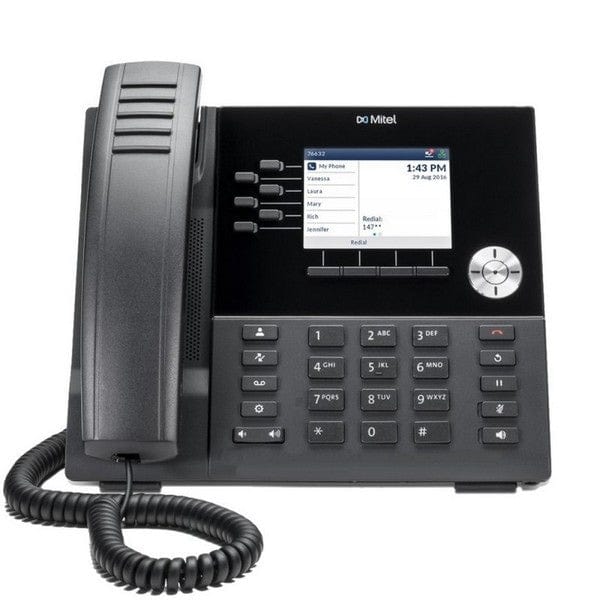Mitel

Mitel Networks Corporation is an acclaimed global telecommunications powerhouse based in Ottawa, Canada. Established over two decades ago, its expertise lies primarily in VoIP solutions and applications since the company had a dramatic shift of ownership back in 2001.
With a widespread international presence through offices and partners coupled with top-notch resellers across the globe, Mitel remains committed to delivering high-quality services driven by its mission for cutting-edge innovation.
In 2018, a group of visionary investors led by Searchlight Capital Partners announced their acquisition of the company – ushering in an exciting new era for its future.
Mitel Introduction
Founding
In 1973, a dynamic duo shook up the tech industry by founding Mitel – an iconic company whose name originates from a creative combination of its founders’ first names and their initial product: “Mike and Terry Lawnmowers.”
The true meaning behind this endearing moniker remains somewhat mysterious; however, Mike Cowpland‘s assertion that it stands for “Mike AND Terry Electronics” has been corroborated during BBC Radio 4’s ‘The Bottom Line.
Mike and Terry created a revolutionary lawnmower business, taking the inspiration for its name from their employer Bell Northern Research.
With this new venture came great responsibility; they needed to guard their hard work in tone-to-pulse converter design so that it remained solely theirs.
Michael Cowpland’s Ph.D. thesis led to a remarkable innovation: the telephony tone receiver product, transforming tones into pulses for central office use.
This creative adaptation came in response to their first shipment of lawnmowers being lost on its journey, which also proved unsuitable for Canadian lawns.
After their groundbreaking tone receiver invention saw immense success, the founders of a telecom company decided to expand into new horizons. Realizing how integral microprocessors and software were in switch design, they unveiled the SX200 PBX.
This ambitious step kickstarted their decade-long journey towards becoming a $100 million annual revenue business by 1981.
In 1976, the company took a decisive leap forward when it acquired Siltex, a bankrupt CMOS foundry in Bromont, Quebec.
What followed was extraordinary growth and innovation as the newly-formed semiconductor division specialized in pioneering mixed signal and thick film hybrid devices – technologies essential for device advancement today.
Seeking to revolutionize office systems, the SX2000 was unveiled as a revolutionary digital PBX.
Perceived as an opportunity to unite voice and data applications under one operating system, it promised to completely transform how businesses managed their communications within the organization – introducing an era of easier communication coordination between departments.
In 1985, a financial crisis threatened the future of Mitel. To solve this problem, British Telecom stepped in and bought 51% of the company; however, they soon exited after only a few years.
It seemed all was lost until an investment firm called Schroder Ventures took over control and dramatically changed things – introducing new management that sparked renewed life into Mitel.
Mitel pursued further innovations, launching an array of acclaimed products such as the SUPERSET phone terminals and GX5000 Central Office. They also ventured into cutting-edge semiconductor technologies with their SMART-1 call controller.
With a mission to revolutionize telecommunications, Mitel has continued to be at the forefront of technological progress.
Separation
In the early 2000s, Matthews embarked on a daring venture when they invested $230 million in acquiring Mitel’s communications network division.
This created an entirely new chapter for Mitel Networks and paved the way for innovative Voice over IP technology using internet standards-based PBX systems.
The original company held on tight to its semiconductor division, renaming it Zarlink Semiconductor in a nod to networking – the Tsar of Links.
In 2001, Matthews established Mitel Knowledge Corporation and transferred several patents to the company, eventually becoming MKC Networks. This pioneering business created a family of innovative SIP-based IP PBX systems that revolutionized communication capabilities.
After more than two decades in business, Mitel Corporation underwent a dramatic reorganization that separated the company into three distinct entities.
The first was Zarlink Semiconductor Inc., which retained its original corporate name; this division focused on telecom components and solutions.
Secondly, Mitel Networks Corp took over communication systems and hosted services for enterprise customers worldwide; lastly came BreconRidge Manufacturing Solutions – an independently operated contract manufacturer of advanced electronic products.
IPO
On May 10, 2006, a newly formed venture excitedly announced its plan to enter the public realm with an Initial Public Offering. Although specifics were kept under wraps, the word was that they wanted an impressive $150 million injection of funds.
In 2007, Mitel embarked on unprecedented expansion as they agreed to purchase Inter-Tel.
This historic merger resulted in the new combined company being twice the size of Mitel alone – marking a major milestone for both companies and ushering them into their next chapter.
After months of negotiations, Mitel was born in August 2007 due to the successful merger between the two companies. An announcement from management detailed that operations would continue under this newly unified name, and with its arrival came an unexpected departure – shortly after coming together, Mitel withdrew its IPO registration process.
Terry Matthews can claim his entrepreneurial prowess by controlling Mitel Knowledge (now MKC Networks) and Mitel Networks, two successful telecommunications companies.
On April 22, 2010, Mitel initially stepped into the spotlight with a splash by listing on Nasdaq at $14 per share. Unfortunately, this optimism was short-lived, in only one year.
Their stock price had plummeted to an abysmal low of $5.50 – so badly that CNBC’s Jim Cramer dubbed it one of the worst IPOs of the year.
Cramer identified a trifecta of issues that stifled the market – ambitious valuations, excessive debt, and unease over potential insider sales. These factors combined caused a swift decline in stock prices.
After leading the company to success for many years, Don Smith (CEO) has decided to retire and step away from his current role.
The board of directors is now searching for a fitting successor who will take over once selected, while Smith will remain on the board in an advisory capacity.
Acquisitions
In June 2013, Mitel announced its strategic purchase of prairie fire Software Inc., a world-renowned provider of contact center, business analytics, and workforce optimization software.
This acquisition cost them approximately $20 million in net cash – allowing access to the OEM’s cutting-edge technology, which they had previously been supplying to Mitel for its existing contact center solution.
In 2013, Mitel Corporation made a big impact in the telecommunications industry by purchasing Aastra Technologies.
Fast forward to March 2015, and they were again making waves as they acquired Mavenir Systems for an impressive $560 million – but that wasn’t all.
Another game-changing move was between these two transactions: buying leading contact center supplier OAISYS in 2014.
In April 2016, Mitel and Polycom announced the intention to form a massive multi-billion dollar union. This planned merger was set to give existing shareholders of Polycom cash and new shares in Mitel.
However, this proposed agreement eventually fell apart when an alternate deal with Siris Capital Group superseded it – resulting in Polycom having to pay out $60 million as compensation for canceling the original plan.
In July 2017, Mitel experienced a major expansion with its acquisition of ShoreTel for $530 million – doubling the size and strength of both companies. With this merger, they could grow from 2,100 employees to an impressive 4,200.
Divestiture
Mitel jumped into the new year of 2013 by announcing that DataNet CommSource had been sold to EarthBend, LLC. In December 2016, Mitel continued its transformation by selling its mobility unit for 385 million dollars and shifting its focus to providing Unified Communications solutions.
Went in Private Hands
On November 30, 2018, Mitel underwent a monumental shift when Searchlight Capital Partners acquired it. The acquisition resulted in delisting of all shares from the TSX and Nasdaq stock exchanges – signaling an exciting new chapter for this renowned organization.
In 2019
After a failed attempt to join forces with Avaya, Mitel underwent some leadership changes when CEO Richard McBee resigned in October 2019. Mary McDowell then took his place, and the company made more moves two years later, forming an alliance with Five9 in May 2021.
Litigation
In 2011, Mitel took decisive legal action against two Australian companies for leveraging its trademark without permission and misleading customers. The first case was quickly put to rest; however, the second dispute between a chain of mobile phone stores named MyTel and HappyTel is still ongoing.
Mitel 6920

Mitel MiVoice 6920 IP phone is the cream of the crop in new-gen desktop technology. This enterprise-class telecommunication device offers an array of intuitive features and applications that make it a user favorite with its color backlit display, large graphics feature, self-labeling keys, and four responsive softkeys – promising ease of use and superior value.
Enjoy crystal-clear audio quality with Mitel 6920. It offers a wideband experience and an advanced speakerphone that amplifies conversations for maximum clarity.
Plus, it has native support for analog, DHSG/EHS, and USB headsets – no extra setup is required.
Achieve business success with the powerful and efficient Mitel MiVoice 6920 IP phone.
Boasting fast dual Gigabit Ethernet ports, Mitel and third-party peripherals support, and an eco-friendly PoE class 2 rating, this advanced desktop device is perfect for any modern enterprise executive or manager looking to stay connected at all times.
Compatible with the acclaimed MiVoice Business system – take your operations further today.
Mitel 6920 Features
- Immerse yourself in the visual experience of a 3.5″ QVGA (320×240) TFT LCD with adjustable brightness to capture every detail.
- With its built-in two-port, 10/100/1000 Gigabit Ethernet switch and USB 2.0 port, you can easily connect peripherals and modules such as DHSG/EHS, Wired Analog Headsets, or Mitel M695 Programmable Key Module while leveraging the features of the Enhanced Wideband Full Duplex Speakerphone for handsfree calls and an AC Power Adapter (sold separately).
- Utilize up to 18 functions through six programmable multi-function keys featuring self-labeling capabilities along with four intuitive state-sensitive softkeys
Mitel Alternatives
- Avaya
- 8×8
- RingCentral
- Microsoft
- Cisco
- Verizon
- Vonage
- AT&T





